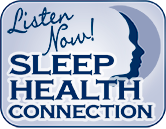Lazy Dog Days of Summer
 Summer heat, fresh air and outdoor activities can help many people achieve a good night’s rest, but if your summer days are more lazy than fun, you could be suffering from a sleep disorder. While we may want to attribute fatigue to summer’s carefree abandonment of a strict schedule, a sleep disorder, caused by disrupted breathing and snoring, leads to daytime drowsiness, difficulty concentrating, memory and mood problems.
Summer heat, fresh air and outdoor activities can help many people achieve a good night’s rest, but if your summer days are more lazy than fun, you could be suffering from a sleep disorder. While we may want to attribute fatigue to summer’s carefree abandonment of a strict schedule, a sleep disorder, caused by disrupted breathing and snoring, leads to daytime drowsiness, difficulty concentrating, memory and mood problems.
Summer brings weekend picnics, vacation, and outdoor sports that can leave one feeling exhilarated and exhausted. Many of us dream of long weekends resting on a porch and returning from vacation refreshed. However, if your week end gardening or a trip to the lake is plagued by feeling tired, cranky and frustrated, you could be ignoring a vital sign that your health is at risk. Sleep disorders, once diagnosed can be treated.
Typical symptoms of a sleep disorder including sleep apnea can include-
- daytime sleepiness
- snoring
- difficulty concentrating
- memory problems
- depression
- feeling as if you are in a fog
After a physician referral, patients undergo a sleep study that analyzes the length and type of sleep you are getting as well as how many times you experience waking, or, alerting during the night. If you are diagnosed with a sleeping disorder, there are treatments available that can increase your quantity of sleep and quality of life.
Previously, a CPAP machine (continuous positive airway pressure) was the only medical treatment. Now, less cumbersome and intrusive methods are available such as a dental sleep appliance. The custom-made device, much like a mouth guard, subtly alters the alignment of the jaw which positively impacts alignment for breathing properly at rest. She advises that if you are getting a full night’s sleep, and continue to wake un-refreshed and fatigued throughout the day, you may be suffering from a sleep disorder.
So if your weekend trips to the garden center or the chores of lawn work leave you feeling more dogged than refreshed, find out if a sleep disorder could be keeping from enjoying the fruits of your labor.






(630) 369-5508